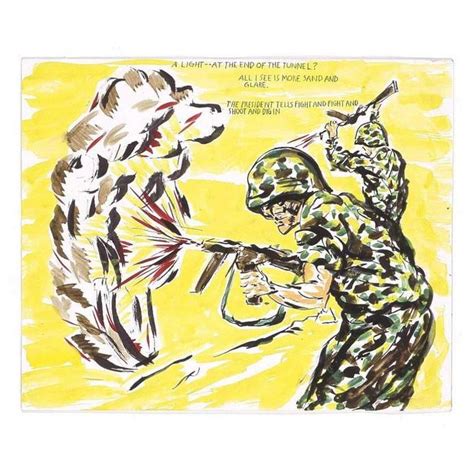A Quote by Raymond Pettibon
Anyway, the way political history is passed down is influenced and spoiled by the closeness of the writers to the political figures that they're writing about. It's a sad state of affairs, but there's probably more veracity of reporting in my work than there is in the newspapers.
Related Quotes
Some writers like to boil down headlines of liberal newspapers into fiction, so they say there shouldn't be communal riots, everybody should love each other, there shouldn't be boundaries or fundamentalism. But I think literature is more than that; these are political views which most of us hold anyway.
I can't define myself as a political writer - I don't think I've earned it, and I don't function as a political writer in the way that many of the writers I admire do. It's not simply a question of context, of where I'm writing from - there is much in American society that urgently needs to be written about. I think your work is always engaged with politics in the looser sense of the word - and that looseness is itself a kind of privilege - because politics and culture are evidently intertwined.
[The political mind] is a strange mixture of vanity and timidity, of an obsequious attitude at one time and a delusion of grandeurat another time. The political mind is the product of men in public life who have been twice spoiled. They have been spoiled with praise and they have been spoiled with abuse.
For me, what is political is very personal. Politics are not this abstract idea. Laws are the rules that dictate how we live our lives. What we eat is political. How we dress is political. Where we live is political. All of these things are influenced by political decision-making, and it's important to be part of the process.
I've been asked several times since the book Love and Trouble came out, "Are you still sad?" And I'm not, not in the way I was before. I do feel like it was a season in hell that I passed through. But now I'm in despair and sad and confused every day because of our political situation. So the question is: Is it harder or easier to be sad with a reason?
My reporting in Africa wouldn't be political per se, but it's certainly the point of my reporting - and of a lot of other reporters I know: Human suffering is bad, and if reporting stories about it brings it to light and someone does something, that's part of the point of journalism. And it's a thin line between that and activism, and you have to be careful about that.








































